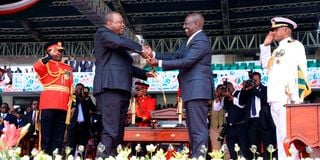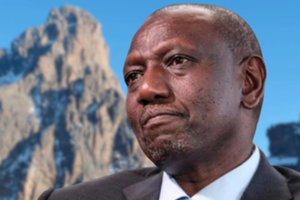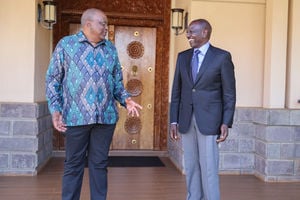
President William Ruto receives the instruments of power from his predecessor Uhuru Kenyatta after he took the oath of office at Moi International Sports Center, Kasarani on September 13, 2022.
President William Ruto is working to fix laws crucial to the 2027 State House race in which he will seek re-election, even as critics question his preoccupation with power transition when the electoral commission is in limbo.
Barely a month after tabling the government-sponsored Elections (Amendment) Bill, 2024 that could end live streaming of presidential election results, President Ruto on Tuesday led his Cabinet in proposing yet another law that would radically alter the transition of power in the next election.
The Assumption of Office of President and Transition of Executive Authority Bill, 2024 which has received the Cabinet’s nod has envisioned a scenario where an outgoing president may fail to physically hand over instruments of power during the swearing-in of the president-elect.
It proposes that in such a case, the handover of instruments of power will be omitted without affecting the validity of the swearing-in process.
When Dr Ruto defied the odds staked against him, including opposition from the outgoing President Uhuru Kenyatta, to clinch victory in the 2022 General Election, there was speculation that his predecessor would be a no-show to hand over power at his inauguration.
However, Mr Kenyatta turned up at Moi International Sports Centre, Kasarani on September 13, 2022, for the inauguration of President-elect Ruto and Deputy President-elect Rigathi Gachagua.
During his address, Mr Gachagua humiliated Mr Kenyatta with a stinging criticism of his reign as president, only for him to have a short-lived tenure.
In October this year, President Ruto orchestrated Mr Gachagua’s impeachment by Parliament and subsequent removal from office. He was replaced by Prof Kindiki Kithure.

President William Ruto receives the instruments of power from his predecessor Uhuru Kenyatta after he took the oath of office at Moi International Sports Center, Kasarani on September 13, 2022.
The former DP has vowed to campaign against the re-election of Dr Ruto so that he can suffer the ignominy of being a one-term President. With the shoe now on the other foot, Mr Gachagua has been pleading for Mr Kenyatta’s forgiveness.
The proposed Bill further provides that the president-elect and deputy president-elect receive security arrangements equivalent to those of the sitting President and DP.
A Cabinet dispatch to newsrooms on Tuesday indicated that the proposed law aims to seal gaps and ensure smoother and more unified presidential transitions in future. The draft Bill is ready for tabling in Parliament, which is currently on a long recess until in February 2025.
The proposed law also seeks to ensure continuity in government operations by allowing Cabinet secretaries and principal secretaries to remain in office until new appointments are made by the incoming administration.
The Bill further provides that the transition of Executive authority will be deemed to have been completed when the president, DP, Attorney-General, Cabinet secretaries, principal secretaries, and the Secretary to the Cabinet assume office.
Other provisions outline the role of the president-elect in the nomination and appointment of members of the Assumption of Office Committee and provide for the establishment of a Transition Centre.
The Bill also imposes stricter penalties for State and public officers who obstruct the transition, proposing fines of up to Sh10 million, imprisonment of up to 10 years, or both.
The draft bill seems to build on the National Government Administration Laws (Amendment) Bill, 2023 by the National Assembly Leader of Majority Kimani Ichung’wah that sought to amend the assumption of Office of the President Act, 2012 (No. 21 of 2012) by doubling the number of representatives of the president-elect from three to six.
The Bill was informed by the alleged frustration of President Ruto’s allies by the transition team after Mr Kenyatta’s unsuccessful backing of opposition leader Raila Odinga in the presidential race.

President William Ruto displays the sword after receiving the instruments of power from his predecessor Uhuru Kenyatta during his swearing-in ceremony at Moi International Sports Center, Kasarani on September 13, 2022.
Dr Ruto had Justin Muturi (now Public Service Cabinet Secretary), nominated Senator Veronica Maina, his then Chief of Staff Davis Chirchir (now Roads and Transport CS) and Uasin Gishu Woman Representative Gladys Shollei in the transition team.
Government officials in the team include the Head of Public Service, who is also the chair, Attorney-General, Chief of Defence Forces, Inspector General of Police, Interior Cabinet Secretary, Interior Principal Secretary and Foreign Affairs Principal Secretary.
Others are National Intelligence Service Director-General, Chief Registrar of the Judiciary, State House Comptroller, Solicitor General, ICT Principal Secretary and Treasury Principal Secretary.
In a previous interview with Nation, Mr Muturi cited instances where they made decisions as a team only to be frustrated by government officials mandated to execute them.
“You realise the committee as constituted currently is heavy with those in office. In essence, they can frustrate the incoming President in terms of logistics,” said Mr Muturi.
“You make decisions as a team but those in office are not ready and committed to implementing them. Some of the people in the team had taken strong positions and were not willing to facilitate a smooth transfer. I think this proposal is good to ensure ample representation of the President-elect,” he said.
“Those of us who represented Ruto as president-elect got frustrated during the transition period. You agree on simple things like sending out invitation cards, but people at Harambee House decide to sit on them,” he said.
Jubilee Secretary-General Jeremiah Kioni yesterday told Nation that it was surprising that President Ruto was more obsessed with the transition when the Independent Electoral and Boundaries Commission (IEBC) was not yet in place.
Political factions are engaged in a blame game over court cases that have stalled the operations of a selection panel required to recruit electoral commissioners.
“It is amazing how people are keen to come up with laws on transition when we still don’t have IEBC in place,” said Mr Kioni.
He said the opposition will look at the constitutionality of the proposed law to understand the mischief it seeks to cure before they can take a position.
Live-streaming of presidential election results
In the Elections (Amendment) Bill 2024, currently before the Senate, the IEBC will not be compelled to live-stream presidential election results as announced by returning officers at the polling stations if the proposed law becomes a reality.
The Bill seeks to delete section 39 of the Elections Act and introduce another one that, among others, does not require IEBC to facilitate live-streaming of presidential election results as announced.
“The new section has omitted the provisions for the requirement of the IEBC to establish a mechanism for the live-streaming of results as announced at polling stations to facilitate public information,” the proposed law reads.
Currently, the commission is required to live-stream the election results, as announced at the polling stations on its big screens mounted at the national tallying centre.
It is from these screens that the media picks the feed for live broadcast to update the public on who is leading, by what margin and from how many polling stations.
The new section proposes that results at the polling station shall be final and that the presidential election shall be tallied, announced and declared and electronically transmitted before all other elective positions.
The Bill, jointly sponsored by Senate Leader of Majority Aaron Cheruiyot (Kericho) and Senate Leader of Minority Stewart Madzayo (Kilifi), is a product of the National Dialogue Committee (Nadco).
In 2022, the Justice and Legal Affairs Committee (JLAC) of the National Assembly then chaired by Kangema MP Muturi Kigano, overruled IEBC’s proposal not to live-stream presidential election results.
Promoting transparency and integrity
The commission, then chaired by Mr Wafula Chebukati, wanted the law that compelled it to live-stream the results repealed, but the committee opposed saying doing so would defeat the purpose of enhancing transparency in the announcement and declaration of the election results.
“The commission shall establish a mechanism for the live-streaming of the presidential election results as announced at the polling stations,” the committee recommended in its report tabled in the House, adding that live-streaming of election results is one way of conforming to the constitutional principles of transparency and accountability.
“Kenyans should be able to compare the live-transmitted results with the final declared results to confirm the accuracy of the election results,” the committee added.
The projection of presidential results as announced at the polling stations was enacted for the purposes of reducing anxiety among Kenyans and promoting transparency and integrity in the management of elections through public information.
In the August 9, 2022 General Election, there were over 46,200 polling stations in the country, meaning that to undertake an individual tallying of the presidential election, one has to sample more than three quarters of the forms 34As, which is tedious compared to getting what IEBC has live-streamed.











